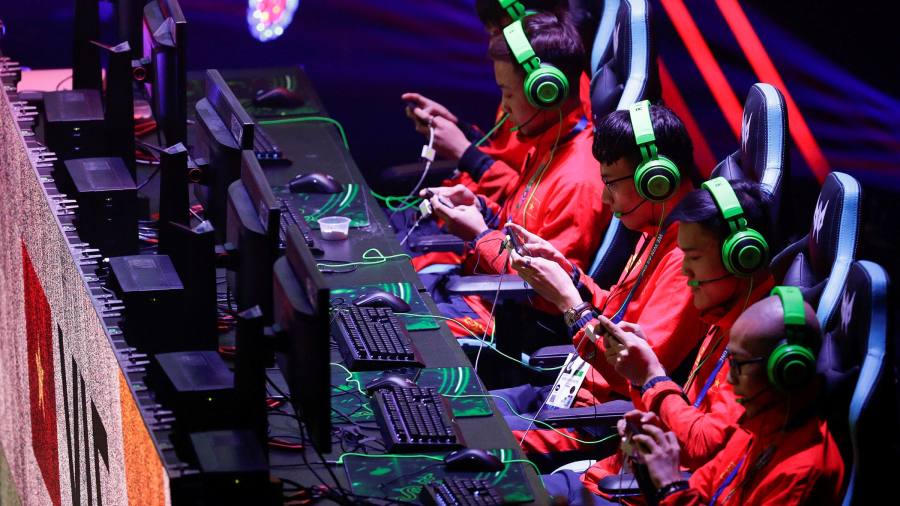[ad_1]
TikTok’s parent company ByteDance is on a spending spree to expand beyond its blockbuster video app into gaming, where it is taking on the world’s largest gaming company, Tencent.
ByteDance began buying up small gaming companies in 2017, but on Monday it paid a reported $4bn to buy Moonton, a Shanghai-based studio set up by a former Tencent staffer, giving it a tent-pole franchise, Mobile Legends.
The company has also been trying to poach developers from rivals, offering them salary increases of 30-50 per cent, according to three games developers at Tencent and NetEase, who added that most of their colleagues had also been approached by headhunters for ByteDance over the past two years.
“These will be Bytedance’s most important one to two years to decide the outcome of their gaming strategy. If they can’t do it now, they never will,†said Liao Xuhua, online entertainment sector analyst at Analysys, who added that the company faces the challenge of building a strong enough reputation to draw the best talent and gaming partners.
The push into gaming comes as ByteDance starts to try to diversify away from advertising. Through Douyin, the Chinese version of TikTok, ByteDance has already won 27 per cent of China’s advertising market, according to Founder Securities, which estimates its Rmb116bn ($17.7bn) ad revenues in 2019 came second only to those of Alibaba.
As advertising growth slows, ByteDance now needs to add more business lines, said analysts.
“ByteDance is very similar to Tencent: they have many apps drawing huge user traffic, but they need to find a way to monetise the traffic. That means more adverts, gaming and virtual products, or ecommerce. Advertising has been consolidated: they need to find something else,†said Zhang Hua, associate professor of finance at China Europe International Business School in Shanghai.
Expanding into gaming is also a way of hitting back at Tencent, whose dominance of China’s gaming market has restricted ByteDance’s social-media platforms by stopping them from broadcasting shows featuring games under Tencent’s empire. That is a big problem when one of the world’s most popular mobile games, Tencent’s Honor of Kings, can draw 180m viewers for a tournament finale.
Without the legacy of a strong in-house game development unit, ByteDance has to expand by persuading others to partner with it, and publishing third-party games. Its gaming teams were mostly poached from Tencent, NetEase and Beijing-based game developer Perfect World, whose senior director is now head of ByteDance’s Beijing games studio.
As well as high base salaries, ByteDance has plenty to offer recruits. Its social-media apps, Today’s Headlines and Douyin, draw the most user-hours of all China’s apps. In the first half of 2020, these two apps’ users spent roughly 73 minutes on each app every day, according to TalkingData, and can supply many adverts to drive user traffic to its games.
But although this creates a rapid influx of users, attrition is also high.
Retaining users depends on the content of the game, and creating good content relies on well co-ordinated teams who have a “common understanding of how to createâ€, said Liao.
“It’s not an industry where you can just take all the best employees from other companies and make a great game,†Liao said.
Would-be recruits also share these reservations about ByteDance’s so-far unproven strategy in gaming. While a high ByteDance base salary looks flashy, remuneration in the industry is heavily reliant on year-end bonuses of up to 10-months’ pay, which rely on games’ success.
“They’ve been in the industry for a few years, but they’ve not achieved results in the ‘heavyweight’ gaming category,†said one former Tencent games employee, referring to the high-spend, high-user time category of multiplayer arena-style battle games.
However, analysts and game developers said that the fragmentation of the gaming market gives ByteDance many niches to grow: casual games with lower time-spend, open-world games that the user can explore at a leisurely pace as opposed to battle games, and games aimed at the under-tapped female market.
“Their biggest challenge is not the market or the competitors, but their own patience. Alibaba took over seven years to produce a few good games,†added Liao. For a company used to explosive growth within a few years, ByteDance will have to shift gears in gaming.
Additional reporting by Nian Liu and Qianer Liu
[ad_2]
Source link





